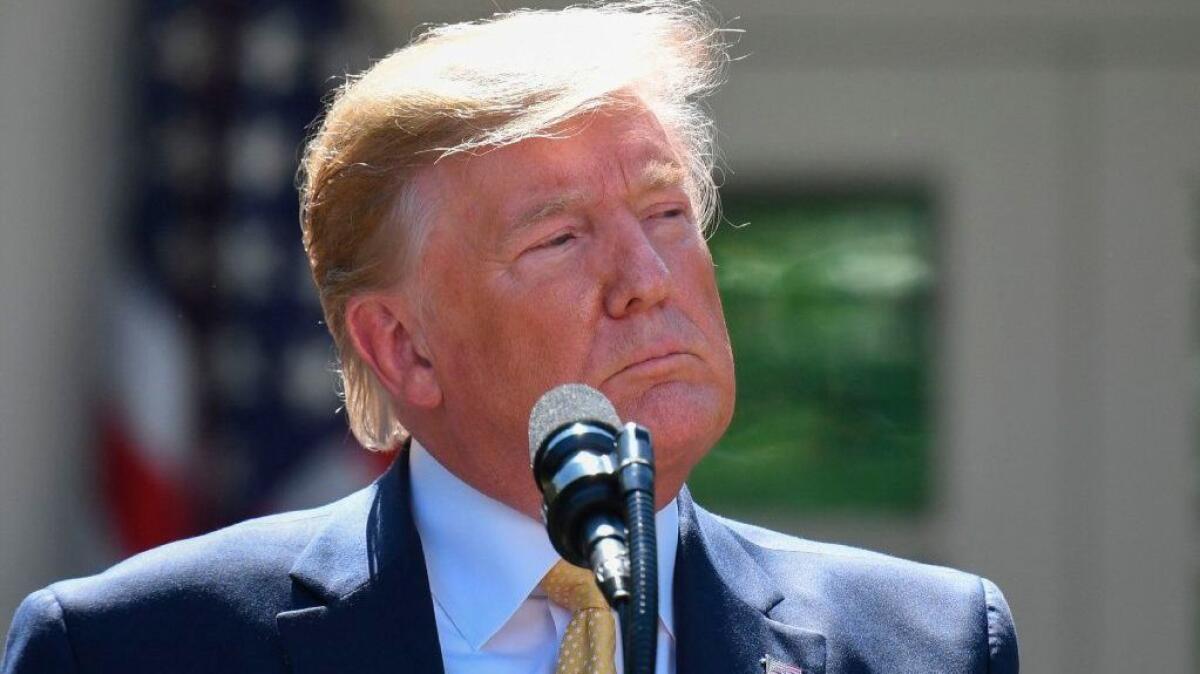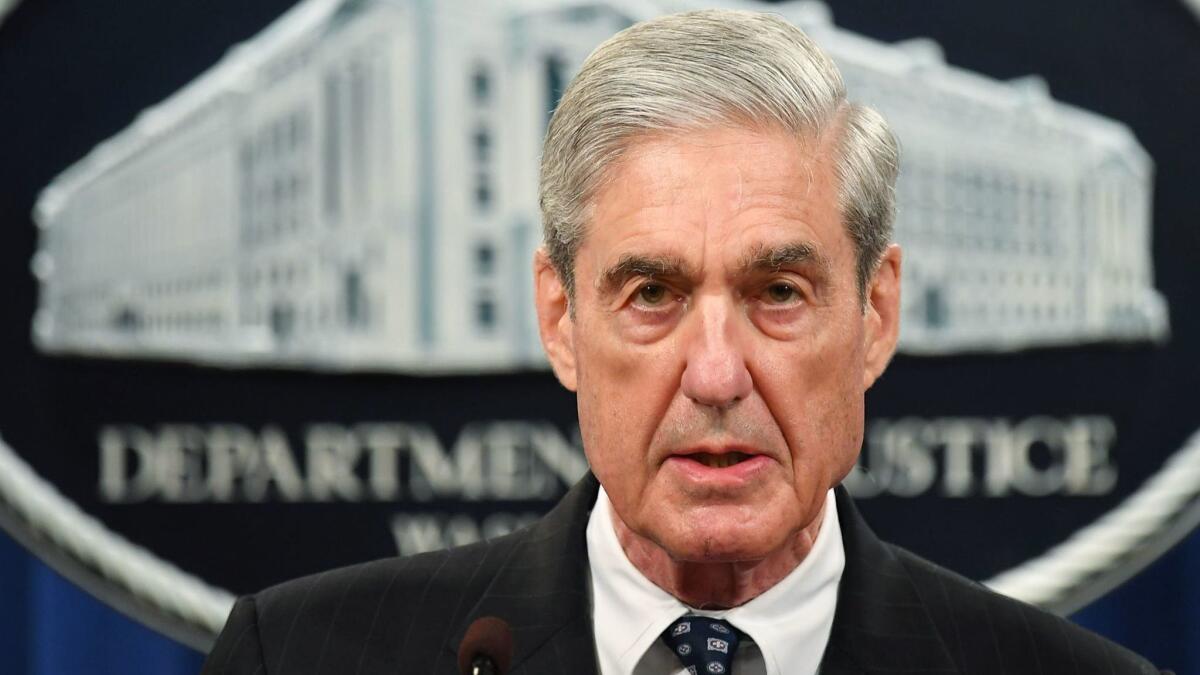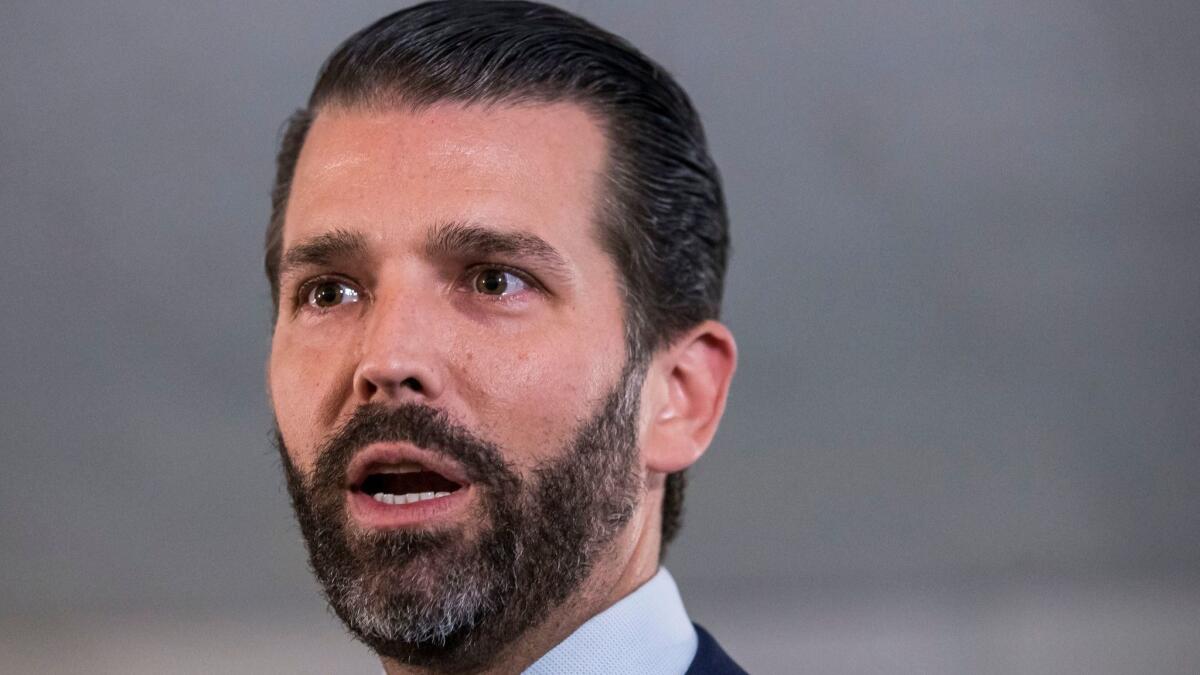Trump said it’s OK to take campaign dirt from foreign powers. Is it legal?

- Share via
After three years of scandal over Russia’s interference in America’s 2016 election, President Trump drew a storm of criticism for saying he would not tell the FBI if a foreign country offered him dirt on an opponent.
Even after Trump backed off Friday and said he would indeed notify law enforcement, his maneuvering still raised questions about what’s legal and what’s not when it comes to foreign influence in U.S. elections.
What exactly did Trump say?
In an ABC News interview with George Stephanopoulos on Wednesday, Trump was asked whether his son Donald Trump Jr. should have contacted the FBI after receiving an email promising incriminating information from the Russian government about Trump’s 2016 rival, Hillary Clinton.
“Give me a break — life doesn’t work that way,” the president said.
“There’s nothing wrong with listening,” Trump added.
Reminded by Stephanopoulos that FBI Director Christopher Wray has urged anyone in similar situations to notify the FBI, Trump snapped, “The FBI director is wrong.”
Trump backtracked Friday after fellow Republicans warned he was inviting Russian meddling in the 2020 election. “I’d report it to law enforcement, absolutely,” he told Fox News.
What does the law say?
The federal law on attempts by foreigners to influence U.S. elections is fairly straightforward.
It is “unlawful for a foreign national, directly or indirectly, to make a contribution or donation of money or other thing of value, or to make an express or implied promise to make a contribution or donation, in connection with a federal, state or local election.”
It’s also illegal for a campaign to “solicit, accept or receive” anything of value from a foreigner.
That applies not just to money, but also to such things as donated furniture, said Justin Levitt, a law professor at Loyola Law School in Los Angeles. The definition of a “thing of value” can be open to interpretation, however.
Foreigners can volunteer for a campaign, for instance, but can’t be paid, according to the Federal Election Commission.
Ellen L. Weintraub, a Democrat who chairs the FEC, issued a statement Thursday, saying, “Let me make something 100% clear to the American public and anyone running for public office: It is illegal for any person to solicit, accept or receive anything of value from a foreign national in connection with a U.S. election.”
Does receiving ‘dirt’ on an opponent count?
Daniel P. Tokaji, a law professor at Ohio State University, said he did not believe so.
“My view is that an in-kind contribution has to have some determinate economic value,” he said.
Brad Smith, a law professor at Capital University in Ohio and a former FEC chairman, agreed, saying that conversations with foreign nationals are not unlawful. But if those talks involve a foreign government agent going out and spending money to compile information on a candidate’s behalf, it could be, he said.
Trump again claims he would consider foreign help for his campaign »
In his report on Russian interference in the 2016 election, special counsel Robert S. Mueller III found that opposition research — on which campaigns often spend substantial sums — could be construed as a “thing of value” covered by the foreign donation ban.

Trump told ABC that if you “talk honestly to congressmen, they all do it, they always have. And that’s the way it is.”
Levitt, of Loyola Law School, said the president’s admission opens the door to foreign governments interfering in future elections, starting with next year’s presidential race.
“This is far less about what happened and far more about real concern about what the president is seeking, and what other entities will do going forward,” he said.
Is everybody else really doing it?
Not according to members of Congress.
Rep. Raja Krishnamoorthi (D-Ill.) told CNN, “I have not met a congressman, Democrat or Republican, who’s said that they’ve ever done this.”
On Wednesday, New Jersey Democratic Rep. Tom Malinowski introduced the Anti-Collusion Act, which would require individuals running for office to report offers of assistance from foreign powers.
Have campaigns gone to the FBI in the past?
During the interview, Stephanopoulos brought up the example of Al Gore’s campaign receiving a debate prep book stolen from the campaign of George W. Bush, his opponent in the 2000 presidential election. The Gore campaign turned the materials over to the FBI.
But the situation isn’t comparable, Trump replied. Smith, the former Republican FEC chairman, agreed.
“If you get a confidential document, that you know has been either stolen or leaked in violation of confidentiality privileges, I could see that being a very different reaction,” Smith said.
Nonetheless, Smith found Trump’s remarks troubling.
“I think it’s legitimate for Americans to be concerned that the president is perhaps too cavalier about foreign sources,” he said.
Was it legal for Trump and his aides to welcome Russian help in 2016?
In 2016, Trump’s son-in-law Jared Kushner, his campaign chairman Paul Manafort and Trump Jr. met with Kremlin-linked Russian lawyer Natalia Veselnitskaya in New York. They’d been promised derogatory information about Hillary Clinton, though nothing useful emerged from the meeting.
Bob Bauer, White House counsel to President Obama, wrote last year that the conditions of the meeting suggested there was a violation of federal campaign laws.

“The Russians did not merely offer information, plucked from the sky: In the first place, they had to have procured it,” and gathering the material likely meant spending money, he wrote in a 2018 post. “Both the material they proposed to provide and the expenses associated with creating and arranging to deliver it raise the serious question of in-kind contributions to the campaign.”
Mueller weighed whether to charge Trump Jr., Kushner and Manafort with violating the ban on foreign contributions. He ultimately declined to bring charges because investigators did not find enough evidence to show the men had “knowingly and willfully” taken information from a foreigner, and they could not establish its value.
More to Read
Get the L.A. Times Politics newsletter
Deeply reported insights into legislation, politics and policy from Sacramento, Washington and beyond. In your inbox twice per week.
You may occasionally receive promotional content from the Los Angeles Times.











